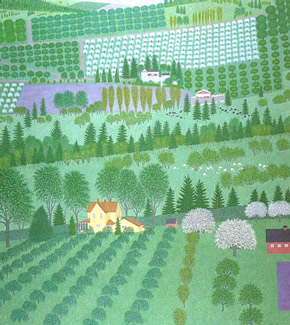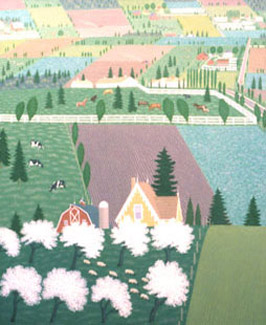
|
|
On the Family Farm
Statistics can be interesting. The problem is that there are too many statistics these days: the important ones are lost, or are used for questionable purposes. Did you know that only 5 percent of British Columbia's total land area is described as agricultural? Did you know that only 20 percent of that is actually under cultivation? Did you know that about half of the provinces total agricultural production comes from the Lower Fraser Valley?
The Latin poet Virgil wrote one of the most celebrated poems on farming, and farming as an activity has long been a motif in painting as well. The activity has been celebrated because it is essentially a peaceful one and is acknowledged to be more productive than warfare and conquest and more dependable than hunting for food.
Robert Michener's recent farm paintings invite us to the quiet contemplation of our special dependence on the soil. We are reminded that our most precious natural resource is the soil. The paintings are therefore like a large format Book of Hours where man's activities within nature are lyrically stated. This harmony finds its expression in a carefully limned harmony of tone, with everything basking in the same light and where nothing seems out of place or obtrusive.
They remind us of the Arcadian ideal we have almost forgotten --and the basis for that all-important “elaboration of (our) arts and crafts", which allows people, such as Robert Michener, the choice to be artists rather than farmers, and almost everyone else to be thankful we have both.
Roger H. Boulet, Director |
 The importance of agricultural activity is something all of us are inclined to take for granted. Our food supply depends on it and many other things beside. "Agriculture, the cultivation of fields (Lat. ager) for the production of a regular supply of crops for food and other needs, is the technical foundation on which the development of stable and sedentary human communities and the elaboration of most other arts and crafts has almost everywhere depended."( Encyclopedia Britannica)
The importance of agricultural activity is something all of us are inclined to take for granted. Our food supply depends on it and many other things beside. "Agriculture, the cultivation of fields (Lat. ager) for the production of a regular supply of crops for food and other needs, is the technical foundation on which the development of stable and sedentary human communities and the elaboration of most other arts and crafts has almost everywhere depended."( Encyclopedia Britannica)  Farming is hard work but it is an activity that is generally in harmony with nature. The soil must be right. The right seeds must be planted at the right time and receive the right amounts of moisture and sunlight. Each season brings it’s own activity, and often its own harvest.
Farming is hard work but it is an activity that is generally in harmony with nature. The soil must be right. The right seeds must be planted at the right time and receive the right amounts of moisture and sunlight. Each season brings it’s own activity, and often its own harvest.